Stuart Aken's Blog, page 282
November 7, 2011
#NaNoWriMo progress Day 7 = 31798 total so far.
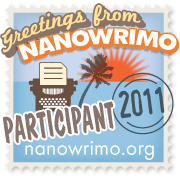 The NaNoWriMo challenge continues to fire me. And, although I have had little time today, I've managed to up the total to 31,798 words. Chapter 10 is now well under way and a few more incidents have crept into the plot as my hero wends his way through life fighting injustice and causing havoc. Along the way, he's met a wonderful woman, but will he be able to keep her, considering his past record in this area? The end of the novel will answer that question. And there's a lot more due to happen before we reach that.
The NaNoWriMo challenge continues to fire me. And, although I have had little time today, I've managed to up the total to 31,798 words. Chapter 10 is now well under way and a few more incidents have crept into the plot as my hero wends his way through life fighting injustice and causing havoc. Along the way, he's met a wonderful woman, but will he be able to keep her, considering his past record in this area? The end of the novel will answer that question. And there's a lot more due to happen before we reach that.
Published on November 07, 2011 19:29
Stuart's Daily Word Spot: Gadfly
 Image via Wikipedia
Image via WikipediaGadfly: noun - horsefly, botfly, or other fly that bites and irritates cattle; someonewho gads about; someone who irritates or harasses others.
'Nina, a consummate rider,was thrown from her horse when a gadfly bit him on his withers.'
'That bloody Nigel is aproper gadfly; constantly dashing about the place and gossiping about everyone,whether he knows them or not.'

Published on November 07, 2011 12:10
November 6, 2011
#NaNoWriMo - day 6 progress = 29099 total
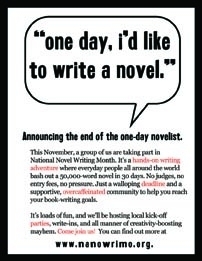 NaNoWriMo challenge continues to go well. I've had two sessions today, totalling 5698 words and taking the running total to 29,099, which is well over my target of 28,000 in each 7 day period. Tomorrow I'll be in the office all day and then dancing (ballroom and latin) with my wife in the evening, so I'll get little done then. Tuesdays are my long day in the office, but I should manage an hour before I start work and maybe another on my return home.
NaNoWriMo challenge continues to go well. I've had two sessions today, totalling 5698 words and taking the running total to 29,099, which is well over my target of 28,000 in each 7 day period. Tomorrow I'll be in the office all day and then dancing (ballroom and latin) with my wife in the evening, so I'll get little done then. Tuesdays are my long day in the office, but I should manage an hour before I start work and maybe another on my return home.I've added a graphic of the word count, over to the right there, which gives the percentage for those interested in such things. For me, it's a visual prompt and motivator.
Well, that's me done for the day, I think. Time to spend a bit more quality time with Valerie, as so far we've only been to the supermarket together and taken a short walk through the local countryside.

Published on November 06, 2011 16:58
Stuart's Daily Word Spot: Facade
 Image via Wikipedia
Image via WikipediaFaçade: noun - principal front of a building, overlookinga street or open space; outward appearance or front, especially when deceptive.
'The façade, dilapidatedand faded as it was, nevertheless retained hints of the past glory of theemporium.'
'Giles adopted his mostwinning smile, knowing his façade of gentle and generous lover would persuadeher to his own purposes before very long.'

Published on November 06, 2011 12:00
November 5, 2011
#NaNoWriMo day 5 progress - to 23401 words.
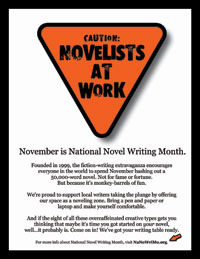 First of all, that total makes it look as though I've done a lunatic number of words today. But that's because yesterday I missed out the words from one session, so they've been added to the total for today. I actually had to go through the chapters and note the total words for each and then add them up as my scrap paper on the desk was so full of figures, I hadn't a clue where I was!
First of all, that total makes it look as though I've done a lunatic number of words today. But that's because yesterday I missed out the words from one session, so they've been added to the total for today. I actually had to go through the chapters and note the total words for each and then add them up as my scrap paper on the desk was so full of figures, I hadn't a clue where I was!Anyway, had a couple of brill ideas overnight: good job I keep a Moleskine and a pen in the bedroom, otherwise I'd have lost those bright sparks.
Still enjoying the weaving of the tale, though I did feel a bit weary at the end of today's last session. Everything moving forward, even if there have been a couple of amusing, if unintended, diversions: we're still moving forward, which is what matters.
Had to add a couple of characters to my spreadsheet timeline, but they were already prepared and just waiting in the wings for me to bring them on stage. So much about this seems to depend on the preparation before the NaNoWriMo challenge starts.
Ah, well, time for relaxation. See what the morrow brings.

Published on November 05, 2011 20:32
Stuart's Daily Word Spot: Enlightenment
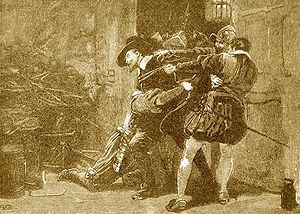 Image via Wikipedia
Image via WikipediaEnlightenment: noun - mentally or spirituallyenlightening; the state of being enlightened; the Enlightenment - thephilosophical movement that occurred in Europe in the 18th century when reasonand individualism started to be emphasized instead of tradition.
'Julie's face lit up withenlightenment as, after years of labouring under the false dogma of the sect,she understood that the organisation existed only to glorify and support itscharismatic leader.'
5th November is Guy Fawkesnight in the UK, when the innocent and guilty alike celebrate the execution ofa man and his cohorts who attempted to murder the then king, so they couldreplace him with a Roman Catholic monarch. That they would have killed manyothers along with their intended victim illustrates the fact that terroristshave long held the general populace in contempt, caring nothing for the livesof other people and blinded by what is often religious dogma.

Published on November 05, 2011 13:00
November 4, 2011
#NaNoWriMo Day 4 progress = total 16832 words
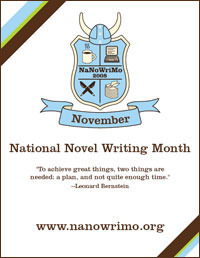 Managed 4 separate sessions today, turning out a little over 6,000 word to reach a total of 16,832 so far. So, well on target, which is just as well, as Mondays and Tuesdays are going to be much less productive.
Managed 4 separate sessions today, turning out a little over 6,000 word to reach a total of 16,832 so far. So, well on target, which is just as well, as Mondays and Tuesdays are going to be much less productive.I feel it's still going well, though the plot has taken a couple of unexpected turns, improving the story, I think. And a couple of characters have sneaked in rather earlier than I initially expected. But that's the beauty of working on a loose framework largely dictated by the way characters interact. It's more fun when you're not certain where the next chapter will take you.
I'm part way into chapter 6 now, and looking forward to another journey tomorrow. This NaNoWriMo challenge is proving more fun, and harder work, than I expected and I'm glad I decided to have a go this year.

Published on November 04, 2011 19:49
Stuart's Daily Word Spot: Dialogue
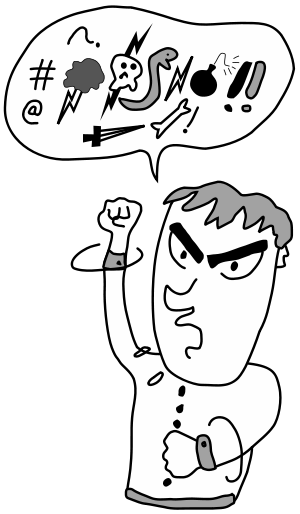 Image via Wikipedia
Image via WikipediaDialogue: noun – a work of literature constructedin conversational form; the part of a novel describing the conversationsbetween characters; verbal interchange or discussion; diplomatic contactbetween nations or blocs; valuable or constructive communication betweendifferent groups.
Dialogue can move a storyforward, increasing the pace, or it can be used to describe events, emotionsand people in a more subtle way than pure narrative. It also breaks up text onthe page, allowing white space to make the passage more appealing to the eye. Alot has been written about tag lines in dialogue and I admit to avoiding themwhenever possible. However, in long passages of dialogue, it's necessary toidentify the speakers from time to time so the reader doesn't become confusedabout who is speaking. Many beginners use adverbsin their tags or replace a simple 'he said', 'she said' with variations like,'shouted', 'cried', 'expostulated', 'avowed', exclaimed' and so on. Some thingsto remember about this: 'he/she said' rapidly becomes 'invisible' to thereader, supplying the clue to the identity of the speaker without drawingattention to the tag. Terms such as 'shouted', 'cried' and the rest aregenerally redundant if the dialogue is well written, as the words and contextwill describe the manner of delivery. And adverbs are best omitted from fictionwriting whenever possible. The general rule of thumb advised by most of thosein the know is that one adverb in a thousand words is quite enough. It's important to be awarethat dialogue in a story is not simply natural speech. If you listen to peopletalking - really listen – you'll observe numerous pauses for thought, often punctuatedby 'redundant' words to fill the space whilst the speaker thinks; 'er', 'youknow?', 'like' are examples of such fillers. Also, people repeat themselves andfrequently speak in banal terms when holding conversations. The job of thewriter is to compose dialogue that reflects the nature of the character withoutreducing the text to boring passages of meaningless twaddle. If a writer canmake his characters into poets as they speak, without resorting to overblownlanguage, there's a good chance that the resultant dialogue will captivate thereader.Another aspect of dialoguewriting often overlooked is the use of contractions. Using the 'correct' formsof phrases that are usually contracted will make your dialogue sound stilted inthe mind of the reader. But that doesn't mean that every instance of suchphrases should be contracted; balance is important.Similarly, the use ofdialect and foul language in dialogue needs to be well regulated if it is notto either confuse or offend the reader. A text peppered with dialect only fullyunderstood by the people who've lived all their lives in the hamlet of NetherPuddleton is likely to have your readers scratching their heads in an effort todiscern meaning. And a block of dialogue with every alternate word as anexpletive will simply irritate and possibly offend many readers. As the modernexpression has it; less is more.
'Get your skinny arse over'ere!' Carter yelled angrily. Here, 'yelled' and'angrily' are unnecessary, as the words and punctuation send the message to thereader.
'Come; place your gentlehand in mine and I'll lead you to the dance.'The reader here knows thatthe speaker is a male, talking to a female. So, if only these two characters appearin this part of the story, no tag is needed to identify the speaker.
'I erm, well, like, I wasabout to, you know, I thought if you, like, erm, well, would like to maybe, ermcome to dinner with me, like?' A little exaggerated; butthis is what a lot of natural speech is like.
'I wondered if you would, maybe,er, have dinner with me?' The same sentiment, butthis time the speaker comes across as a shy or diffident individual asking aquestion of someone admired, and the reader doesn't have to plough through allthe extraneous stuff. The manner of speech, the hesitation and lack ofconfidence are all conveyed by the words used.
'Tha's a raight fotherynugtent, an' there's nay doot ya'll fratter yon gloogs if tha nivver gits outon thither blitherpile.' That the speaker is beinginsulting is clear. However, the meaning of the sentence is impossible todiscern (largely because some of the language used here is invented). But itillustrates the over-use of the dialect form.
'I cannot agree with you,because my view does not tie in with the way you are arguing or with the horribleway you are stating it.'This, apart from soundingpompous, is stilted and unnatural. 'I can't agree with you,because my view doesn't tie in with the way you're arguing or the horrible wayyou're stating it.'This is an improvement.But the following might make for better dialogue, without altering the meaning:'I can't agree; our viewsdon't match and the way you state them is offensive.'
As a final point; notethat punctuation belonging to the speech is included inside the quotationmarks.
'If I ask you nicely, willyou give me what I want?'
But: 'I hope he'll give mewhat I want.' Was she bold enough to ask?

Published on November 04, 2011 11:30
November 3, 2011
#NaNoWriMo Day 3 progress = 12456 words so far
 Image via WikipediaBusy day. 3 writing sessions. Before breakfast, I was up and at the keyboard, with fingers flying. A break for food and a short trip to the shops with my wife; well, I needed some fresh air a rest fro my fingers.
Image via WikipediaBusy day. 3 writing sessions. Before breakfast, I was up and at the keyboard, with fingers flying. A break for food and a short trip to the shops with my wife; well, I needed some fresh air a rest fro my fingers.After lunch, another session; still running well, but a touch of back ache from sitting so long in one position, so I had a break and did a bit of exercise to get the blood flowing.
After the evening meal, a third session that took me to a total of 5,900 words for the day. I suppose that seems a lot. But I've set myself a challenge beyond the NaNoWriMo one of 50,000 by the end of the month. I want to have something that's actually the length of a proper novel, so I've set my target at 120,000 words for the month. That's an average of 4,000 a day. I work all day Mondays & Tuesdays, and half a day on Wednesdays, so I won't manage so many words on those days. That means I need to put in more work on the other 4 days, if I'm to reach the target. And I am determined to do that. So far, I've reached the target for day 3. Hopefully, I'll be able to continue tomorrow at the same rate.
Wish me luck - I'll need it!

Published on November 03, 2011 19:44
Author Interview with Claudia Culmone
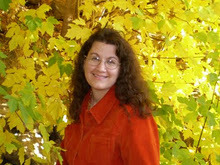 Hello Claudia, please tell us about you, as awriter.
Hello Claudia, please tell us about you, as awriter.Ever since I canremember, I have always wanted to be a writer. I have been writing fictional stories and poetry since a young age. After graduating with a bachelor's degree inEnglish, I began writing for local newspapers while still working on myfictional projects when I could. For thepast eight years, I have worked as an investigative journalist for a legal andbusiness newspaper while occasionally taking on freelance projects such aswriting a teleplay for a client and a biography for another client. Now I work full-time as a writer for anassortment of clients writing news articles, marketing articles, blogs, andpursuing my fictional projects.
Your latest book is Harbor's End; perhaps you'd you give us some insight into it in afew sentences?
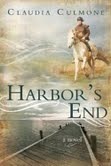 Harbor's End isthe title of my published novel and while some bookstores promote it underRomance it is actually a story about different forms of life and death. The novel is about dealing with the past inorder to move forward. It is the storyof Shanyn Tomilson, who is one of the top riders in the world in showjumping. She has been diagnosed with abrain tumor and moves to the small town of Harbor's End, Oregon, to die. There she meets people who show her that herlife is just beginning.
Harbor's End isthe title of my published novel and while some bookstores promote it underRomance it is actually a story about different forms of life and death. The novel is about dealing with the past inorder to move forward. It is the storyof Shanyn Tomilson, who is one of the top riders in the world in showjumping. She has been diagnosed with abrain tumor and moves to the small town of Harbor's End, Oregon, to die. There she meets people who show her that herlife is just beginning.How did you come to write this particular book?
I suffer from chronic headaches. In college, my doctor wanted to do a CT scanto make sure there was not a tumor. Ithought of what I would do if there was a tumor and this book was the result ofthat process. I also love horses andshow jumping and wanted to write a book with those elements.
Do you have a favourite character from the book?If so, who and why this particular one?
I'm not sureI favour one character over another because they each play an important part inthe story although I adore the dog, Luke.
Where can people buy your books?
Harbor's End canbe purchased through any major bookseller such as Barnes & Noble andAmazon. I have also seen it offered byIndian book websites.
What qualities does a writer need to besuccessful?
Everyone'sdefinition of success is different, but to be a successful writer, you have tohave a true passion for what you do and you have to be willing to devote a lotof hours to your craft as well as perform the necessary research. I've heard it said that being a writer is 10%talent and 90% hard work and I agree with that. I spend a lot of time doing research.
What's your working method?
I have anorganized approach to writing books, keeping an electronic file and a paperfile on each project which contains sketches of landscapes, character profiles,plot ideas, floorplans (I design home floorplans and use them for my books),notes on research subjects, data pulled from reputable websites, and other informationrelated to the project. I also createeach chapter as its own document with a title that reminds me of the main eventin that chapter. Doing this makes iteasier to find a scene when I need to check something and to edit. Scenes that I decide to take out are kept ina separate file for possible use later.
The firstthing I do when preparing to write a new book is research the topics that aregoing to be in the book. For example, Ifound a great book on show jumping with the technical terms, training tips, andoutlines of courses to help me create some of the scenes in the book. Then I sketch ideas and start writing thefirst chapter. I also write out ageneral plot to map out events in the story.
What's the single biggest mistake made by beginnerwriters?
I think mostwriters tend to ignore the importance of research. To be an effective writer, you have to knowyour subject, and that means you need to do your research if you are not anexpert. For example, if you are writingabout a person who is a lawyer, you need to sound like a lawyer and you need toknow legal terms so that you can use them in the dialogue. When I wrote Harbor's End I did a lot of research to find the right tumor thatwould work for my story line and I used a real medical procedure in thenovel.
To what extent are grammar and spellingimportant in writing?
Grammar andspelling are extremely important when it comes to writing—especiallygrammar. To be a good writer, you needto be able to assemble sentences and you need to be able to structureparagraphs. You can hire a professionaleditor to clean up your writing, but that can be very expensive. I do all of my own editing and that workswell because I am the one making the decisions regarding structure and flow. Also, you should never rely entirely on yourspell check because it will miss errors. Reading and rereading the manuscript with a critical eye is the bestmethod.
How much do you revise your MS before sending itoff?
I am aperfectionist so I do a lot of editing to make sure the book is the way I wantit to be. I will not let anyone look atthe manuscript until I get to a point when I can read it without wanting tomake any changes to it. Then I know itis ready.
As a writer of fiction, to what extent do youthink genre is useful in the publishing world?
I really donot pay a lot of attention to genres. What is important to me is the story itself and the message I want it tocarry. Sometimes I think genre titlescan be a bit distractive.
Many authors see marketing as a bind. What'syour opinion on this, and how do you deal with it?
Unfortunatelyin today's modern age, marketing is becoming an essential part of being awriter. My feelings regarding marketingare conflicted because there are many examples of books that attract a lot ofreaders without a lot of marketing and vice versa. I write because I love to write and teach—notbecause I am trying to be famous, and for me, the greatest joy is sharing whatI create with other people and encouraging them to think about issues andconcepts. I think it's important to dowhat you feel comfortable with, when it comes to marketing. You can talk about your book all you want,but you cannot convince every person to read it. If you like to blog, keep a blog. I would rather write books than write a blog,but I do have a blog that gives information about my fictional projects andposts about issues I feel are important. I find that talking with people and letting them find out that I have anovel works more effectively in creating interest. Because my novels deal with importantsocietal issues, my goal is to get people to think about these issues—not tonecessarily sell books.
What support, if any, do you receive from familyand friends, writing group, or dedicated professionals?
I have asmall group of friends with whom I share my novels. The deal is that they can only read thechapters if they give me an honest opinion and feedback regarding thestory. This is really helpful becausesometimes they will catch something I didn't see. It is also a lot of fun to be able to talkabout the characters and the story with others.
Is presentation of the MS as important as agentsand publishers suggest?
My publisherwas recommended to me by another author and so I just filled out the paperworkand sent them the manuscript. I have notdone book queries. I look at publishersas what they can do for my book rather than what I can do to get them to takeit. I feel it is important to send anedited manuscript that is professional and without errors. Publishers are more likely to pay attention toa manuscript that is polished and ready to go, than a manuscript full of errorsand structural problems. When my novelwas published, it was kept 99.99% the way I wrote it. There were only a couple of small wordchanges and I attribute this to the effort I put into the novel to make sure itwas polished before I submitted it.
How long does it take you to write a novel?
The length oftime it takes to write a novel varies. Iwrote Harbor's End in about a yearand then took a couple of years to edit it as I worked on it when I had freetime. My recently completed novel wasdrafted in three months and then took about 15 years to rewrite and editbecause I would put it away for months at a time. I am estimating my next project to take abouta year—I am already five chapters into the novel.
Who or what inspires your writing?
Just aboutanything can inspire me when it comes to writing. As I've already stated, music is a hugesource of inspiration. Places I visitare also sources of inspiration—I use a couple of places I've been asguidelines in my current projects. Beingan investigative legal and business journalist, I am inspired by societalissues that I see in the world around me and some novels reflect that. My sequel to Harbor's End for example, will address animal abuse as well as acouple of other things. History is a biginspiration and one of my future projects came from my studies of the Holocaustand my thoughts and impressions from the things I have read.
If there's a single aspect of writing you findfrustrating, what is it?
The mostfrustrating part of writing is what some writers call writer's block. I hate it when I know where I want the storyto go but my mind goes blank for a while regarding how to move it to that nextpoint.
Is there a particular feature of writing thatyou really enjoy?
I love it whenthe characters take over and tell you what they are going to do. While Harbor'sEnd was not that way, my recently completed novel was. It's so exciting when characters suddenlyappear and you know that they are supposed to perform some role but you have noidea what that role is until the moment in the story arrives and then theanswer is clear. I had severalcharacters that were intended to be minor characters and took on a larger roleand characters that appeared out of nowhere. It was like going on the adventure with them because I often had no ideawhat was going to happen next. It was alot of fun to write.
Do you believe creative writing is a naturalgift or an acquired skill?
I believethat a good writer has both elements of possessing a talent for writing andputting in the work to develop that talent. You can have a very creative mind and love to make up stories but ittakes a lot of hard work and discipline to sit down and write a novel. You should always be looking for ways toimprove those skills. A good writer willtell you that they do not know everything while a poor writer will tell youthey do know everything. You shouldknow your weaknesses and be working to strengthen those weaknesses. You should also try different kinds of writingwhich will help you hone your fictional skills. I often use journalism rules in fictional writing and am always lookingfor the best way to tell the story.
What are you writing now?
I recentlyfinished writing a new ending for my fantasy novel, The Legend of Kaira, so now I will turn my attention back to thesecond book for the Harbor's End series. I will also probably be resuming work on mynovel about domestic violence. I like tohave a couple of different projects to work on so that when I have writer'sblock on one, I go work on another novel for a while.
Do you have a website or blog where readers canvisit?
My blog is www.claudiaculmone.blogspot.com
Given unlimited resources, where would you doyour writing?
If I couldwrite anywhere, it would be in a little cottage on the Oregon coast where Icould sit out on the deck, listen to the ocean and have my horses grazingnearby. I would also probably travel toplaces around the world with a laptop where I could sit for a while and write.
Where do you actually write?
My office isin the bedroom so that is where I do a significant amount of writing. However, I also work in the living area on alaptop and occasionally on the deck where I can enjoy a view of the mountainsand smell the fresh air. I have a smartphone so I have also been known to write scenes in stores, at church, and inother places—especially when inspiration hits.

Published on November 03, 2011 14:00



